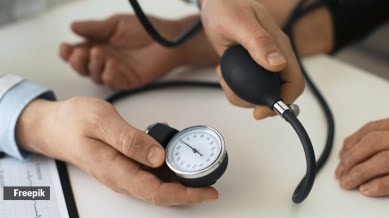📣 For more lifestyle news, click here to join our WhatsApp Channel and also follow us on Instagram
‘My blood pressure is 160/84 mmHg, creatine level is 1.5 mg/dL, and eGFR is 68. Is it normal?’
If you have symptoms like headache, visual changes, shortness of breath, chest pain, or swelling, seek urgent medical attention rather than waiting for routine follow up

Most people are concerned about their health parameters, given the rise in chronic lifestyle conditions, including blood sugar and blood pressure. As such, when we came across a particular Quora query — ‘My blood pressure is 160/84 mmHg, creatine level is 1.5 mg/dL, and eGFR is 68. Is it normal?” — we decided to turn to experts to understand it in detail.
Dr Parin Sangoi, consultant, interventional cardiologist, Wockhardt Hospitals, Mumbai Central, said a normal reading of blood pressure should ideally be around 120/80 mm Hg. “A systolic value of 160 indicates stage 2 hypertension. That means your heart is working harder than it should. This can stress blood vessels and organs like the kidneys and eyes. It’s not an emergency, but it does need attention; through medication, diet changes, and consistent monitoring,” said Dr Sangoi.
monthly limit of free stories.
with an Express account.
Dr Aarti Ullal, physician and diabetologist, Gleneagles Hospital, Parel, said that a 160/84 mmHg level increases cardiovascular risk and warrants evaluation and treatment planning.
How about creatinine of 1.5 mg/dL?
Dr Sangoi explained that a creatinine of 1.5 mg/dL is slightly above the normal range (around 0.6 to 1.2 mg/dL for adults). “This doesn’t automatically mean kidney disease, but it signals that your kidneys may be under strain; sometimes from dehydration, high blood pressure, or certain medicines. If this value is new or rising, it deserves follow-up,” said Dr Sangoi.
What does an eGFR of 68 mean?
The estimated glomerular filtration rate (eGFR) measures kidney function. “Anything above 90 is considered fully normal. A reading between 60 and 89 suggests mild reduction; often reversible with proper hydration, blood pressure control, and lifestyle changes,” said Dr Sangoi.
Dr Ullal affirmed that an eGFR of 68 is above the usual threshold used to define chronic kidney disease stage 3. “By that measure, the patient doesn’t have moderate kidney disease, though interpretation depends on age, sex, muscle mass, and trend over time,” said Dr Ullal.
What should one do next?
*Track your blood pressure daily for a week and consult your doctor about medication if it stays high.
*Limit salt and processed foods.
*Stay hydrated and avoid excessive protein supplements or painkillers that stress the kidneys.
*Get repeat kidney tests after a few weeks to see if levels stabilise.
Dr Ullal also stressed lifestyle changes like salt reduction, weight loss, regular aerobic exercise, alcohol and smoking cessation. “Elevated blood pressure can harm the kidneys and heart. Discuss these results promptly with your clinician to determine whether starting or adjusting antihypertensive therapy and ongoing kidney monitoring are needed. If you have symptoms like headache, visual changes, shortness of breath, chest pain, or swelling, seek urgent medical attention rather than waiting for routine follow-up,” said Dr Ullal.
While the numbers aren’t alarming, they’re “early warning signs”. “The goal is to act now; manage your pressure, protect your kidneys, and prevent future complications,” said Dr Sangoi.
DISCLAIMER: This article is based on information from the public domain and/or the experts we spoke to. Always consult your health practitioner before starting any routine.
📣 For more lifestyle news, click here to join our WhatsApp Channel and also follow us on Instagram